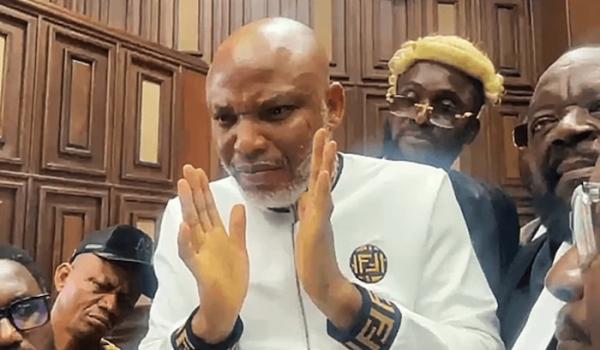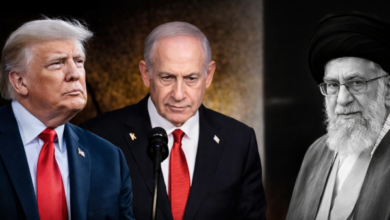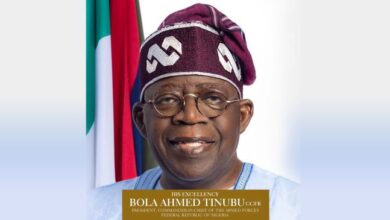
The long-running legal battle between the Federal Government of Nigeria and Nnamdi Kanu, leader of the proscribed Indigenous People of Biafra (IPOB), entered a decisive phase on Thursday as the Federal High Court in Abuja overruled his objection to the court’s jurisdiction and ordered him to open his defence in the terrorism-related charges brought against him.
Presiding Judge Justice James Omotosho ruled that all issues raised by Kanu challenging the court’s jurisdiction had already been addressed in previous rulings, and therefore could not be revisited at this stage of trial. In a firm but measured tone, the judge urged Kanu to exercise his constitutional right under Section 36 of the 1999 Constitution to defend himself, emphasizing that the court would not entertain further attempts to derail proceedings on settled issues.
The court adjourned the case to October 24, 2025, for Kanu to begin his defence formally.
A Trial at a Crossroads: Legal Maneuvers and Symbolism
The Thursday proceedings opened dramatically, reflecting both the tension and symbolism of a case that has tested Nigeria’s judicial system, constitutional principles, and national cohesion.
Senior Advocate of Nigeria (SAN) Chief Adegboyega Awomolo, appeared for the prosecution, while Chief Kanu Agabi, SAN, a former Attorney-General of the Federation and once-lead counsel to Kanu, stood to announce his team’s formal withdrawal from the case.
Agabi stated respectfully that he and his fellow SANs—including Onyechi Ikpeazu, Paul Erokoro, Emeka Etiaba, and Joseph Akubo—were withdrawing because “the defendant has taken this case back from us, and we respect that.”
It was a rare moment of procedural decorum and professional restraint, but one that marked a turning point: Kanu had decided to represent himself.
Kanu Takes Over His Own Defence
Following Agabi’s announcement, Justice Omotosho directly addressed Kanu, who was seated in the dock. Calmly but resolutely, Kanu confirmed that he had disengaged his entire legal team and would conduct his case personally.
The court then directed all junior lawyers, apart from the withdrawing SANs, to vacate the courtroom, clearing the space for the embattled IPOB leader to make his oral submissions.
Kanu, speaking clearly and assertively, declared that he would not proceed with his defence until the court addressed what he termed “a jurisdictional defect” at the heart of the trial.
“This is a jurisdictional issue that goes to the root of this case,” he stated, outlining four key grounds upon which he challenged the court’s authority to try him.
Kanu’s Four Grounds of Jurisdictional Objection
- Alleged Contempt of the Court of Appeal Judgment:
Kanu argued that the Federal Government remained in contempt of an earlier Court of Appeal ruling which, according to him, ordered his acquittal. He insisted that until the government complied with that decision, the prosecution had no legal standing before the court. - Validity of the Enabling Laws:
He contended that the Terrorism Prevention (Amendment) Act 2013 and Customs and Excise Act, under which he was being tried, were repealed laws, thereby nullifying the foundation of the charges. - Denial of Fair Hearing:
Kanu complained that his prolonged detention by the Department of State Services (DSS) had deprived him of the right to adequate legal consultation and preparation, amounting to a breach of his constitutional rights under Section 36. - Alleged Forgery of Medical Report:
The IPOB leader further claimed that the medical report certifying him fit to stand trial — purportedly issued by a panel constituted by the Nigerian Medical Association (NMA) — was forged. He said he was never examined, and no samples of his blood or urine were collected for testing.
On these grounds, Kanu urged the court to declare the proceedings void and order his immediate release.
Prosecution Counters: ‘The Issues Are Settled Law’
Responding, Chief Awomolo, SAN, dismissed Kanu’s oral submissions as procedurally defective, arguing that any such objections must be raised through a sworn affidavit, not oral claims.
He further clarified that the Court of Appeal’s decision, which Kanu relied upon, had been set aside by the Supreme Court in its December 15, 2023 judgment, thereby restoring the charges and validating the Federal High Court’s jurisdiction.
“The judgment he relies on no longer exists in law,” Awomolo argued.
“If he wishes to raise preliminary objections, he must file them properly with supporting evidence.”
On Kanu’s claim of a forged medical report, Awomolo countered that the report had been tendered in open court without any objection from the defence’s previous legal team, which included multiple senior advocates.
He described Kanu’s new claim as an indirect indictment of his own counsel, who never challenged the document’s authenticity at the time.
Judge Omotosho’s Ruling: The Law Must Take Its Course
Justice Omotosho, ruling from the bench, held that all issues raised by the defendant had already been determined in earlier rulings, including the September 26, 2025 no-case submission, where the court found that Kanu had a case to answer.
He recalled that when the medical report was tendered on October 16, both parties were consulted, and neither objected.
“Having been admitted and acted upon, the court cannot now revisit it,” he said, affirming that “all decisions made on the basis of that report remain valid and binding.”
The judge also noted that he had provided extraordinary latitude to ensure Kanu’s right to a fair trial — even vacating the courtroom between 9 a.m. and 2 p.m. the previous day to allow private consultation between Kanu and his lawyers, contrary to the defendant’s claims of restricted access.
“In the spirit of fair hearing, I vacated the court to enable private discussions. The claim that the DSS monitored the conversation has no evidence before this court,” he said.
A Judge’s Plea for Decorum and Due Process
Justice Omotosho’s tone was notably conciliatory, blending firmness with judicial empathy.
He repeatedly appealed to Kanu to take advantage of his constitutional right to defend himself, stating:
“I beg and appeal to the defendant, in the name of the Almighty God, to comport himself and conduct his defence. This is the opportunity the Constitution gives under Section 36 — a right he can exercise or waive, either expressly or by conduct.”
The judge then directed Kanu to open his defence but paused proceedings when Onyechi Ikpeazu, SAN, one of Kanu’s former counsel, stood to make a humanitarian plea.
Ikpeazu requested the court to grant Kanu additional time to “compose himself and prepare properly” for the next stage of the trial.
Kanu, seizing the cue, told the court that he had not had adequate time to prepare since assuming his own defence.
“I only had three hours yesterday to consult in this courtroom. Section 36 gives me the right to adequate facilities to prepare for my defence. My Lord, I need time,” Kanu said.
Awomolo raised no objection, prompting Justice Omotosho to adjourn the matter to October 24 to allow Kanu to prepare his defence.
Witnesses and Next Steps
The judge also revealed that he had signed the witness summonses requested by Kanu and that they were available for collection.
These summonses are expected to be served on several high-profile Nigerians listed by Kanu as potential witnesses in his motion filed on October 21, 2025.
Among the names reportedly listed are former and serving government officials, military chiefs, and state governors — a signal that the defence strategy may rely on political and institutional testimonies to challenge the legitimacy of the trial.
BRANDECONOMY Analysis: The Legal Crossroads of Sovereignty and Rights
Kanu’s trial continues to straddle the complex intersection of national security, judicial independence, and human rights law.
From a jurisprudential perspective, the case is a defining test of Nigeria’s constitutional due process and the limits of judicial discretion in politically charged prosecutions.
While Justice Omotosho’s rulings have consistently upheld procedural fairness and adherence to precedent, Kanu’s strategy appears aimed at transforming the courtroom into a platform for constitutional contestation — particularly over state power, detention rights, and the legality of anti-terrorism statutes.
For the judiciary, the case underscores the delicate balance between protecting the rule of law and maintaining public order in a polarized socio-political environment.











